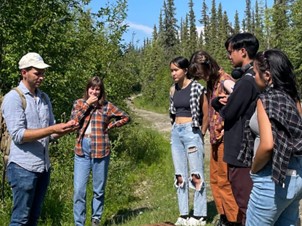BLaST celebrates Scientist of the Month

Mario Muscarella, an assistant professor of microbiology at the Institute of Biology and Department of Biology and Wildlife at the University of Alaska Fairbanks. Muscarella is the August BLaST Scientist of the Month.
Since 2016, the Biomedical Learning and Student Training (BLaST) program at UAF has highlighted scientists from all biomedical fields through its Scientist of the Month articles. University of Alaska Fairbanks faculty Mario Muscarella of the department of biology and wildlife was selected as the August BLaST Scientist of the Month.
Mario Muscarella is an assistant professor of microbiology at the Institute of Biology and Department of Biology & Wildlife at UAF. He received a BLaST faculty pilot project award for 2021-2023. He earned his Ph.D. in biology from Indiana University with an emphasis in both ecology and evolution and microbiology. He completed his postdoctoral training at the University of Illinois at the University of Quebec at Montreal. He enjoys outdoor activities including hiking, camping and skiing and doing projects around the home.
Muscarella joined UAF in July 2020 and has since recruited a number of undergraduate, graduate students, and a research professional to join his lab. Research in the Muscarella Lab focuses on the role of microorganisms in natural, host, and managed ecosystems. This includes exploring factors that contribute to, and impact microbial biodiversity for ecosystem function.

He is the principal investigator of a BLaST faculty pilot project that focuses on wild Alaskan berries and the importance of their microbiomes. He and his students are looking at impacts of climate change that causes low-quality berry conditions such as berry rot and desiccation, and the role of microorganisms in the environment and how environmental changes alter the structure and function of microbial communities. For this work, the team is collecting berries from around the UAF campus and at the Caribou Poker Creeks Research Watershed located roughly 50 km northeast of Fairbanks, Alaska.
Muscarella teaches numerous courses including BIOL 342: Microbiology, BIOL 694: Computational Skills in Biology, and BIOL 692: Environmental Microbiology and Microbial Ecology Seminar. He recently taught a portion of BLaST’s Biomedical Science BMSC 224: Entering Research: Undergraduate Research Experience course to the Rural Alaska Honors Institute’s (RAHI) 2022 Summer Research students. Muscarella encourages students to be highly engaged and to think critically about the course content. His goal is to promote scholarship and strengthen students' ability to apply what they learn rather than memorize facts.
Since joining UAF, Muscarella has mentored six undergraduate researchers including two BLaST Scholars – Jill Jacobs and Tyler Baker-Chapman; and two other undergraduates from Skidmore College and Oberlin College. In addition, he mentors two UAF graduate students and will be welcoming a third this fall. The Muscarella Lab believes in an open, inclusive, collaborative lab atmosphere that promotes personal well-being and research enthusiasm. This includes establishing mentorship plans that acknowledge the mentees desired outcomes and mentee/mentor expectations. His lab also encourages undergraduates to seek career and professional development opportunities through the Ecological Society of America and the American Society for Microbiology and other organizations.

These BLaST Scientist of the Month articles are shared across all UAF and University of Alaska Southeast rural campuses and with BLaST’s partners: Iļisaġvik College, Fort Lewis College, Diné College, Salish Kootenai College and Alaska Pacific University. For more BLaST Scientist of the Month highlights, visit their website.
Biomedical Learning and Student Training (BLaST) is a National Institutes of Health-funded
UAF program that enhances capacity for undergraduate biomedical research training
and efficacy for engaging students from diverse, especially rural Alaskan, backgrounds
in education and training for biomedical research careers. BLaST started in 2014 and
continues to provide research opportunities for faculty, staff and students through
its many workshops, curriculum, and research support.
Any questions about this article or any BLaST publications, please contact Amy Topkok.


